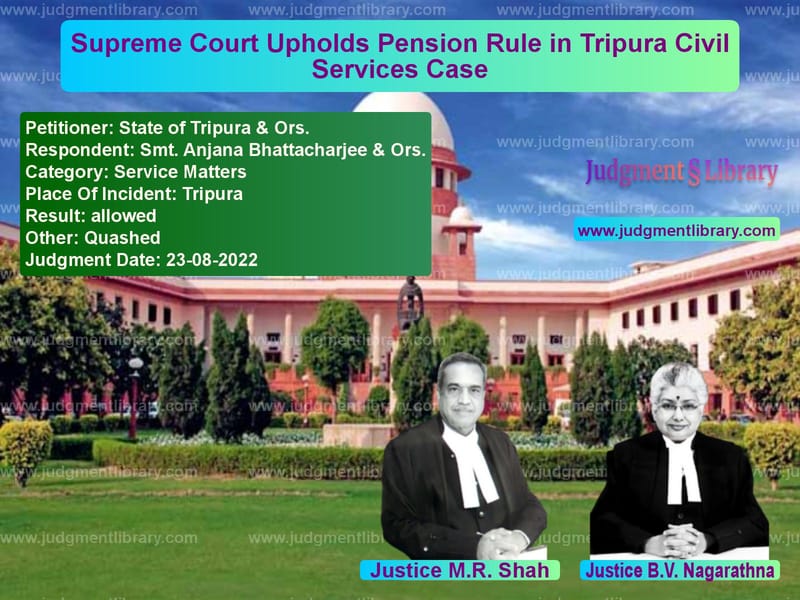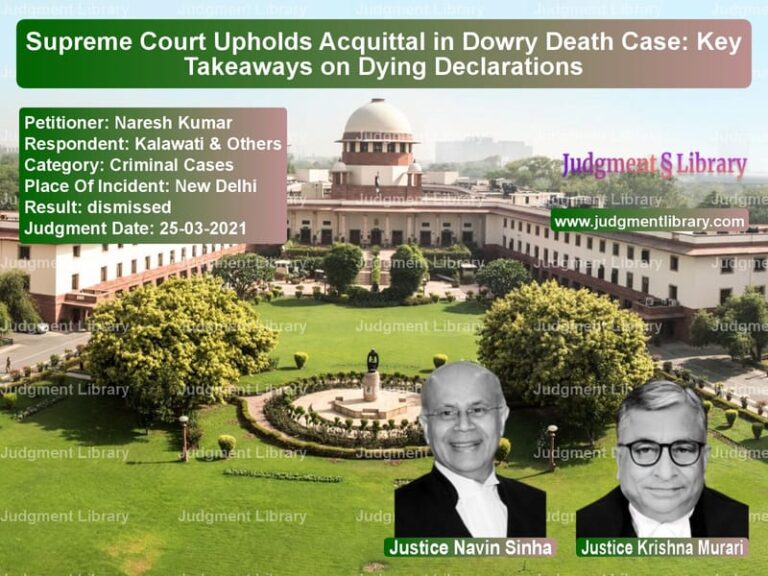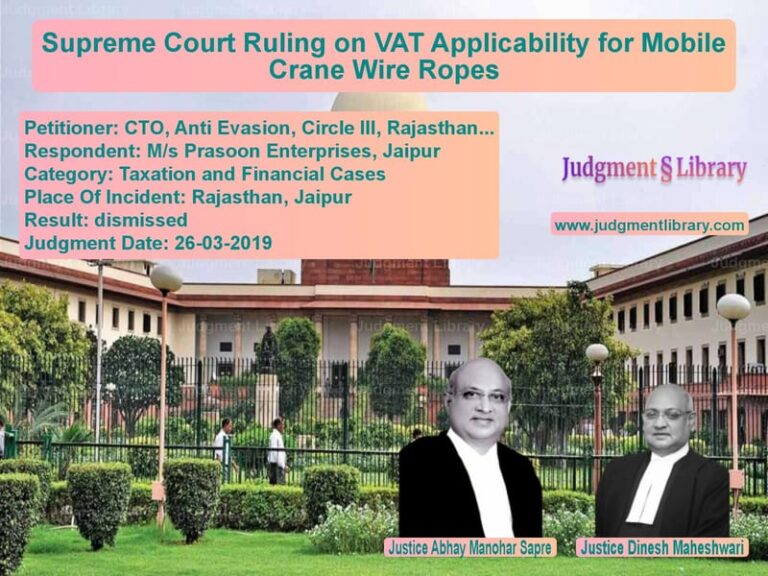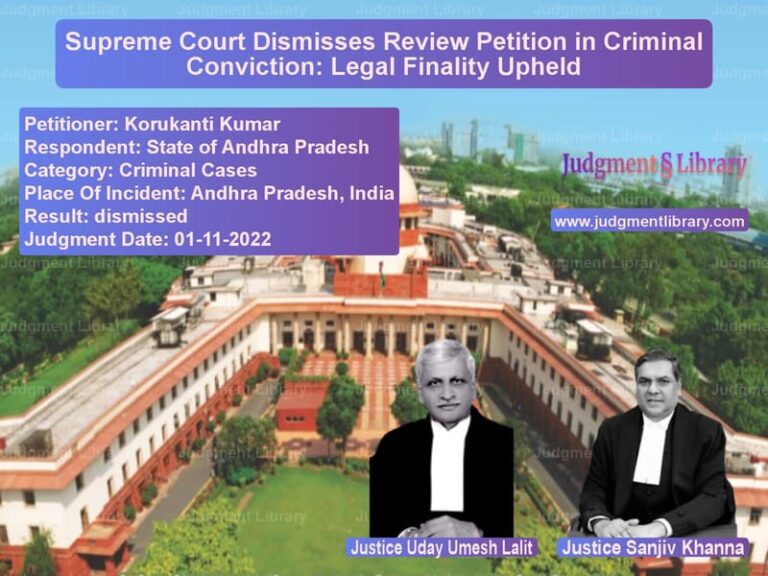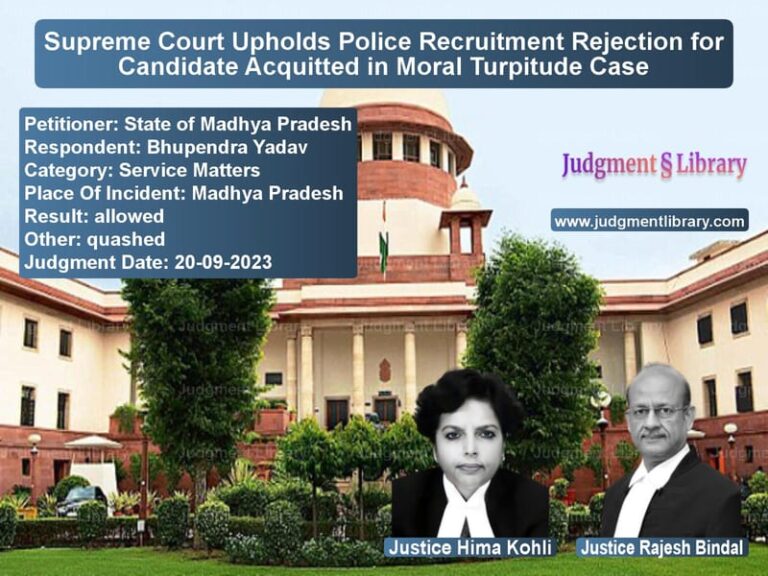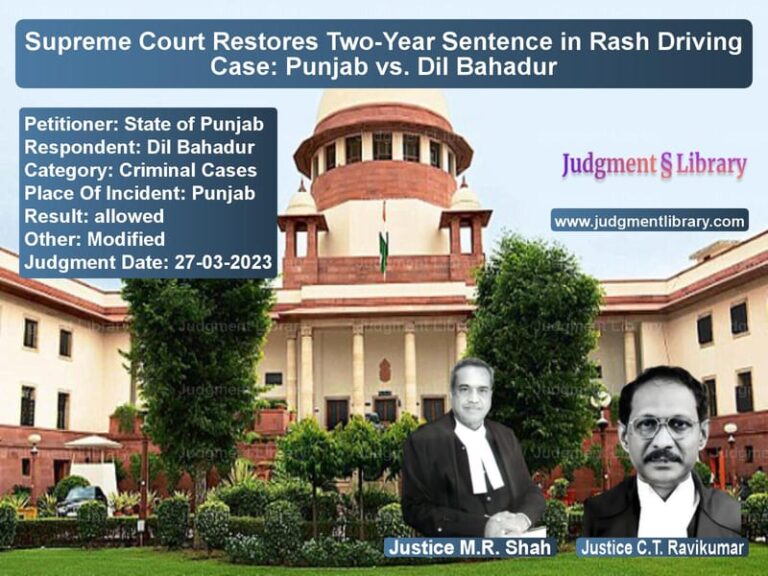Supreme Court Upholds Pension Rule in Tripura Civil Services Case
The case of The State of Tripura & Ors. vs. Smt. Anjana Bhattacharjee & Ors. concerns the legality of Rule 3(3) of the Tripura State Civil Services (Revised Pension) Rules, 2009. The Supreme Court overturned the High Court’s ruling, which had struck down the rule, reaffirming the state’s power to set a cut-off date for pension revision based on financial constraints.
Background of the Case
The respondent, Smt. Anjana Bhattacharjee, retired as a Reader-cum-Vice Principal on February 28, 2007. Her pension was initially computed at Rs. 9,150 based on her last drawn basic pay of Rs. 18,300. With the revision of pay scales, her pension was revised to Rs. 26,850, calculated on a revised basic pay of Rs. 53,700.
However, under Rule 3(3) of the Pension Rules, 2009, financial benefits from the revision were only applicable from January 1, 2009, and not from the earlier period of January 1, 2006, to December 31, 2008. The pension from that period was computed notionally.
Legal Issues Before the Court
- Whether the State of Tripura’s decision to fix January 1, 2009, as the cut-off date for financial benefits was arbitrary and violated Article 14 of the Constitution.
- Whether the High Court was justified in striking down Rule 3(3) of the Pension Rules, 2009.
- Whether financial constraints could be a legitimate ground for limiting the retrospective application of pension revisions.
Arguments Presented
Petitioner’s (State of Tripura’s) Arguments
- The state argued that due to severe financial constraints, it was unable to bear the additional burden of paying arrears of revised pensions from 2006 onwards.
- The state relied on precedents where financial constraints were accepted as a valid ground for setting a cut-off date.
- The government maintained that the decision was a well-thought-out policy matter and not arbitrary.
Respondents’ (Retired Employee’s) Arguments
- The respondent contended that denying actual pension benefits from 2006 to 2008 while implementing the revised pension in 2009 was unfair and discriminatory.
- She argued that 80% of the financial burden was covered by the central government, making the state’s financial constraint argument weak.
- The High Court was correct in striking down Rule 3(3) as violative of Article 14.
Supreme Court’s Observations
On the Validity of Rule 3(3)
The Supreme Court, comprising Justice M.R. Shah and Justice B.V. Nagarathna, held that the rule was neither arbitrary nor unconstitutional.
“Financial constraints can be a valid ground for setting a cut-off date for pension revisions, as long as it is applied uniformly and is backed by a reasonable policy decision.”
On the High Court’s Ruling
The Court found that the High Court had not given sufficient reasons for dismissing the state’s financial constraint argument.
“When specific statistics and justifications were provided by the state regarding financial burden, the High Court should not have dismissed them without cogent reasoning.”
On Pension Cut-Off Dates and Financial Constraints
The Court reaffirmed past rulings that upheld the government’s right to fix a cut-off date for economic reasons.
“Fixing a cut-off date for pension benefits based on financial constraints has been upheld in multiple precedents, including State of Punjab vs. Amar Nath Goyal and State of Bihar vs. Bihar Pensioners Samaj.”
Judgment and Its Implications
The Supreme Court allowed the state’s appeal and restored Rule 3(3) of the Pension Rules, 2009.
- The rule was deemed constitutional and not violative of Article 14.
- The decision reaffirmed the state’s right to make policy decisions on pension revisions.
- The respondent was not required to return the pension arrears already paid due to the interim High Court order.
Significance of the Judgment
- Affirms Government’s Authority: The ruling reinforces the principle that financial constraints can justify setting a cut-off date.
- Prevents Judicial Overreach: It establishes that courts should not interfere with policy matters unless they are patently arbitrary.
- Provides Clarity on Pension Disbursements: The judgment sets a precedent for future cases involving pension revision timelines.
Conclusion
The Supreme Court’s ruling in The State of Tripura vs. Smt. Anjana Bhattacharjee upholds the principle that economic considerations can justify differential treatment in pension revisions. By setting aside the High Court’s order, the judgment affirms the government’s discretion in fiscal policy while ensuring fair treatment for retirees.
Read also: https://judgmentlibrary.com/supreme-court-sets-aside-high-court-judgment-in-sbi-disciplinary-case/
Petitioner Name: State of Tripura & Ors..Respondent Name: Smt. Anjana Bhattacharjee & Ors..Judgment By: Justice M.R. Shah, Justice B.V. Nagarathna.Place Of Incident: Tripura.Judgment Date: 23-08-2022.
Don’t miss out on the full details! Download the complete judgment in PDF format below and gain valuable insights instantly!
Download Judgment: state-of-tripura-&-o-vs-smt.-anjana-bhattach-supreme-court-of-india-judgment-dated-23-08-2022.pdf
Directly Download Judgment: Directly download this Judgment
See all petitions in Pension and Gratuity
See all petitions in Public Sector Employees
See all petitions in Judgment by Mukeshkumar Rasikbhai Shah
See all petitions in Judgment by B.V. Nagarathna
See all petitions in allowed
See all petitions in Quashed
See all petitions in supreme court of India judgments August 2022
See all petitions in 2022 judgments
See all posts in Service Matters Category
See all allowed petitions in Service Matters Category
See all Dismissed petitions in Service Matters Category
See all partially allowed petitions in Service Matters Category

